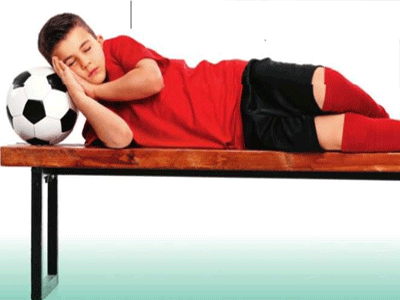- News
- lifestyle
- health-fitness
- fitness
- Is your child fit enough?
Trending
This story is from February 27, 2016
Is your child fit enough?
In a world where iPads have replaced building blocks, today's kids have abysmal fitness levels.

Key Highlights
• In a world where iPads have replaced building blocks, today's kids have abysmal fitness levels.
• Today, building blocks have been replaced by tablets and mobile phones and an abacus by Candy Crush.
• Today, building blocks have been replaced by tablets and mobile phones and an abacus by Candy Crush.
In a world where iPads have replaced building blocks, today's kids have abysmal fitness levels.
One weekend, while vacationing at a hillside resort, Ajay Khatri discovered that his nine-year-old son could not climb the jungle gym that was within the hotel's premises. The revelation rattled the 42-year-old financial consultant -after all, such activities were integral to his own childhood."Although I grew up in Mumbai, where there is a lack of open spaces, my friends and I would go to the terrace and jump about or play hide and seek on the stairs. I am sad that my son is missing out on all the fun". But even more worryingly, experts point out that parents like Khatri are no longer a minority. "Such cases will soon be the norm," says Mohit Sahni, co-founder of Kleinetics, a fitness programme for kids. "Nowadays, children are not able to perform or enjoy simple athletic movements. They are unable to participate in a game of catch or play hopscotch as they require basic use of their motor skills which, with the current lifestyle and environment, are highly compromised." As part of Kleinetics, Sahni runs basic fitness classes all over Mumbai. His fitness module trains children in terms of speed, strength, endurance, co-ordination, flexibility and agility. "I make the children jump over a line and jump back. But many times, three out of 10 children are not able to do so. Many lose their balance and or struggle with the exercise".
Decreasing fitness levels
Experts point out that kids' fitness levels have steadily declined over the years. "Children are not active anymore," says Heena Dave, an assistant PT teacher at Sheth Gopalji Hemraj High School in Borivali East. "I have been teaching for the past twenty years and I see the difference. Earlier, children would look forward to games or a PT period in school. But now, children are unable to perform simple drills and tasks that are set for them. There is a definite loss of interest." And contrary to popular notion, academic achievements do not always reign supreme. "f an eight year-old child struggles to run or play catch, then just imagine what his state will be when he is 30 years old," points out Sahni. "Children are very flexible and agile by birth, but as they age, they tend to be less flexible. They become stiff and also lose their agility and swiftness." He also points out that engaging children in athletic activities with games that are fun will enhance their cognitive skills. "Children with low fitness levels, where motor skills and basic hand-eye coordination are compromised, risk postural difficulties and long-term health ramifications when they become adults," he adds.
Shun a sedentary lifestyle
Today, building blocks have been replaced by tablets and mobile phones and an abacus by Candy Crush. "Why does an eight-year-old need an iPad? This will only encourage him or her to sit on the couch and not venture out," says Dave. "They have all the friends they need on social media, so why will children leave the comfort of their house? Dependence on technology at such an early age will take a toll on their body. They will start slouching for they are bent over the screens of their phones and tablets."
Play time, points out Pednekar, has been taken over by tuition time."The system is wholly geared towards promoting a sedentary life, which compromises on the general physical agility of a child. If a child is pretty much stationary for six days a week, then how will she be able to play on the seventh day?"
Follow the parent
So where do the parents come in? "Children follow their parents, so they need to lead by example. If they want their child to be physically fit, then they also need to up their game," adds Pednekar. Parents need to make sure that the child is engaged in outdoor activities and not transfixed by a computer screen. Experts suggest that parents take baby steps towards bettering their children's lifestyle by first shunning expensive gadgets and investing in a football or skipping rope instead. "Parents need to prioritise basic physical fitness in the same vein as they prioritise doing well academically," says Sahni.
What can you do to make your child physically fit
- Engage with them through a physical activity: Make this activity a time to bond. "Go cycling with him. Or an evening walk. Stick to it, make it non-negotiable. The first six days the parent will have to initiate it, but surely by the seventh day, the kid will come up and say `lets go for the walk," says Sahni.
- Make them do their own work: Make them move around the house. "Don't let the child sit on a computer and order people about to do hisher errands. Make them go to the corner grocery store and run errands for the house. Make movement a part of their daily life. Make them take the stairs with you, instead of taking the elevator," shares Dave.
- Encourage children to step outdoors as much as possible. In stead of celebrating their birth day at a restaurant, take himher and the group of friends for a camping expedition or hiking.
- Identify the child's problem areas at an early age. If the child is not able to run, or is having problems jumping, then address it head on.
Telltale signs
Find out whether your child is physically unfit
- Is he/she able to sit in Vajrasana, Padmaasana, or the butter fly pose, for five minutes?
- Is he/she able to touch his her toes?
- Is performing a front roll very difficult for your son or daughter?
- Is a game of catch or hopscotch something that your child doesn't do well?
One weekend, while vacationing at a hillside resort, Ajay Khatri discovered that his nine-year-old son could not climb the jungle gym that was within the hotel's premises. The revelation rattled the 42-year-old financial consultant -after all, such activities were integral to his own childhood."Although I grew up in Mumbai, where there is a lack of open spaces, my friends and I would go to the terrace and jump about or play hide and seek on the stairs. I am sad that my son is missing out on all the fun". But even more worryingly, experts point out that parents like Khatri are no longer a minority. "Such cases will soon be the norm," says Mohit Sahni, co-founder of Kleinetics, a fitness programme for kids. "Nowadays, children are not able to perform or enjoy simple athletic movements. They are unable to participate in a game of catch or play hopscotch as they require basic use of their motor skills which, with the current lifestyle and environment, are highly compromised." As part of Kleinetics, Sahni runs basic fitness classes all over Mumbai. His fitness module trains children in terms of speed, strength, endurance, co-ordination, flexibility and agility. "I make the children jump over a line and jump back. But many times, three out of 10 children are not able to do so. Many lose their balance and or struggle with the exercise".
Decreasing fitness levels
Experts point out that kids' fitness levels have steadily declined over the years. "Children are not active anymore," says Heena Dave, an assistant PT teacher at Sheth Gopalji Hemraj High School in Borivali East. "I have been teaching for the past twenty years and I see the difference. Earlier, children would look forward to games or a PT period in school. But now, children are unable to perform simple drills and tasks that are set for them. There is a definite loss of interest." And contrary to popular notion, academic achievements do not always reign supreme. "f an eight year-old child struggles to run or play catch, then just imagine what his state will be when he is 30 years old," points out Sahni. "Children are very flexible and agile by birth, but as they age, they tend to be less flexible. They become stiff and also lose their agility and swiftness." He also points out that engaging children in athletic activities with games that are fun will enhance their cognitive skills. "Children with low fitness levels, where motor skills and basic hand-eye coordination are compromised, risk postural difficulties and long-term health ramifications when they become adults," he adds.
Milind Pednekar, a martial arts expert who has been training children for the past 12 years, points out that such lifestyles among kids can lead trigger an early onset of obesity.“Also, with age, our movements become restrictive. But if we can check this at a young age, the problem can be dealt with,“ he continues.
Shun a sedentary lifestyle
Today, building blocks have been replaced by tablets and mobile phones and an abacus by Candy Crush. "Why does an eight-year-old need an iPad? This will only encourage him or her to sit on the couch and not venture out," says Dave. "They have all the friends they need on social media, so why will children leave the comfort of their house? Dependence on technology at such an early age will take a toll on their body. They will start slouching for they are bent over the screens of their phones and tablets."
Play time, points out Pednekar, has been taken over by tuition time."The system is wholly geared towards promoting a sedentary life, which compromises on the general physical agility of a child. If a child is pretty much stationary for six days a week, then how will she be able to play on the seventh day?"
Follow the parent
So where do the parents come in? "Children follow their parents, so they need to lead by example. If they want their child to be physically fit, then they also need to up their game," adds Pednekar. Parents need to make sure that the child is engaged in outdoor activities and not transfixed by a computer screen. Experts suggest that parents take baby steps towards bettering their children's lifestyle by first shunning expensive gadgets and investing in a football or skipping rope instead. "Parents need to prioritise basic physical fitness in the same vein as they prioritise doing well academically," says Sahni.
What can you do to make your child physically fit
- Engage with them through a physical activity: Make this activity a time to bond. "Go cycling with him. Or an evening walk. Stick to it, make it non-negotiable. The first six days the parent will have to initiate it, but surely by the seventh day, the kid will come up and say `lets go for the walk," says Sahni.
- Make them do their own work: Make them move around the house. "Don't let the child sit on a computer and order people about to do hisher errands. Make them go to the corner grocery store and run errands for the house. Make movement a part of their daily life. Make them take the stairs with you, instead of taking the elevator," shares Dave.
- Encourage children to step outdoors as much as possible. In stead of celebrating their birth day at a restaurant, take himher and the group of friends for a camping expedition or hiking.
- Identify the child's problem areas at an early age. If the child is not able to run, or is having problems jumping, then address it head on.
Telltale signs
Find out whether your child is physically unfit
- Is he/she able to sit in Vajrasana, Padmaasana, or the butter fly pose, for five minutes?
- Is he/she able to touch his her toes?
- Is performing a front roll very difficult for your son or daughter?
- Is a game of catch or hopscotch something that your child doesn't do well?
End of Article
FOLLOW US ON SOCIAL MEDIA









